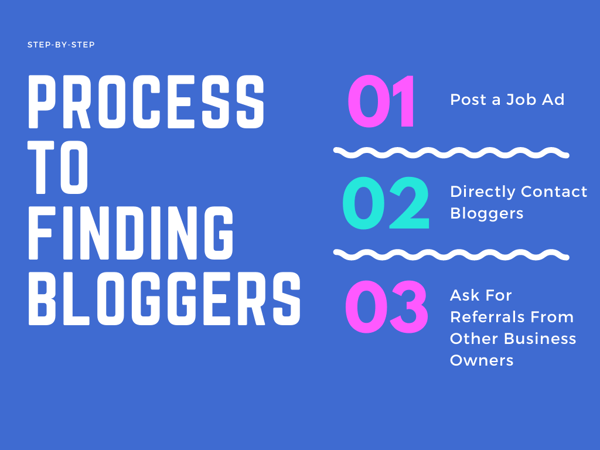Does Linkedin's New Freelance Platform Solve Your Blog Writing Service Needs
According to several sites that report the latest tech news, LinkedIn is developing a new freelance marketing platform that will allow companies to...
6 min read
 Bill Walls
:
Updated on February 7, 2022
Bill Walls
:
Updated on February 7, 2022

A blog is one of the most cost-effective tools you have at your disposal as a business owner.
Not only does it demonstrate your expertise, but it also provides your ideal customers with answers to their problems.
Written effectively, blogs can be strategically optimized for keywords you are trying to rank for in Google searches, making it easier for others to find you when seeking the type of help you offer.
In fact, according to Hubspot, 55% of marketers say blog content creation is their top inbound marketing priority, and B2B companies that use blogs generate 67% more leads than those that don’t.
However, not everyone is a writer or likes to write, and creating a blog also creates a commitment to consistently produce content.
Your time is valuable as a business owner, and you likely don’t have a lot of spare time to sit down each week and draft a blog post. Or, even if you have the time, you may feel you don’t have the writing skills to make it an effective tool.
In either case, hiring a freelance blog writer for your company can provide a solution. But, how do you know if this option is right for your company and worth the investment you’re about to make?
Below we’ll explore how hiring a freelance blog writer can impact your business, as well as some other options available to you, so that you can ultimately decide whether it’s the right fit.
Blogging is a lot of work. If you are considering working with an outside blogger so you can focus on other areas of your company, there are several steps you need to take to ensure you maximize your experience your return on investment.
steps you need to take to ensure you maximize your experience your return on investment.
Several sections need to be addressed when gathering information to supply a content brief to the writer for direction.
If you leave the writing process entirely up to outside bloggers, they will write the article based on what they think you want. Understanding what you are trying to achieve with your blog, and communicating that information to the writer, will make using outside writers more successful.
When it comes to finding a blogger, there are several freelance platforms on the web. You could even do your own searching, putting feelers out on sites like Craigslist or LinkedIn.
However, freelance platforms such as WriterAccess, Zerys and Upwork mediate between the blogger and business provide a higher level of protection. Bloggers often are encouraged to do their best work, and businesses are encouraged to maintain a good relationship because both can be critiqued by the other.
Also, using a platform that holds payment in escrow until both parties are happy with the work allows the platform to mediate any disputes.
Other ways you can find freelance bloggers include:

The cost to you of hiring a freelance blog writer varies tremendously, based on experience, whether you work through a freelance platform site, the size and frequency of the articles you wish to publish, and the quality of services.
While bloggers who have less experience may be more cost-effective, you may end up doing more work in the long run and not getting your money’s worth. Professional freelance writers charge more, but typically you get a higher quality of work.
The Editorial Freelancers Association publishes a range of editorial rates, though notes that is a rough guideline. In general, rates vary considerably and are influenced by a host of factors, including the nature of the work, the time frame and how much expertise is required. According to the site, working with freelance writers directly may cost you anywhere from 6 cents a word on sites like WriterAcess and Zerys to nearly a dollar a word if you hire freelance blog writers directly. With sites like Upwork, you can get writers to bid on your work, allowing you to weigh experience with price.
It’s important to note that if you do hire a freelance blog writer for your business, make sure you agree to a fee ahead of time and that the fee is included in a copywriting agreement that you both sign.
When you directly hire a freelance blog writer, you essentially will serve as that writer’s editor. Even though you won’t write the article, you’ll still need to make time for:
When the work of a writer is completed, you must then take over any other administrative tasks associated with the article. This includes adjusting the format, adding images, adding links to other blogs on your site, and publishing the blog itself.
You’ll also likely need to provide all relevant information to the blogger before the writing begins, which will require prep time on your part. Information may include topic selection, tone of the piece and word count.
When hiring a freelance blog writer, either through a platform or using your own legwork, it’s important to ask for links to their work, as well as references. This will help you get to know a writer’s style because that plays an important part in what you envision for your blog.
references. This will help you get to know a writer’s style because that plays an important part in what you envision for your blog.
Experience or knowledge of your industry also is important. Though you don’t have to set this as a requirement of the writer you hire, it can be beneficial for someone to at least have some knowledge of your industry so the writer can hit the ground running and not require a great deal of training.
Someone who has experience using Search Engine Optimization is critical as well. When someone searches for a topic that is relevant to your blog topic, you want your blog to appear in the search engine results. Otherwise, having a blog is fruitless if, ultimately, it doesn’t direct potential customers back to your website.
Now that you have the information above, the next step would be to decide whether hiring a freelance blog writer is worth the investment. You also may want to explore whether there are any other options available to you that offer the same advantages, but come with other benefits.
For example, if you plan to generate a high number of blogs each month, it may be more cost-efficient for you to hire a full-time or even part-time content writer. However, if you plan to only publish a few blogs a month, hiring a freelance writer might make more sense budget-wise.
As a small business, though, you might not be in a position to hire a full-time staff writer, since you will need to consider other factors, such as offering health insurance to the employee.
Blogging services, on the other hand, provides the best of both worlds.
A blogging service will:
A blog is a cost-effective tool that allows you to connect with your customers and potential customers. While freelance blog writers might be the right choice for your current circumstances, other options are available to consider as well.
A blogging service goes beyond simply writing articles. It saves you the costs of hiring additional employees, while creating a plan to drive traffic to your website, taking care of all the administrative tasks that come with blogging, and providing you with growth and stability for your business.

According to several sites that report the latest tech news, LinkedIn is developing a new freelance marketing platform that will allow companies to...

Most companies today know that you need to do more than just have a website that tells visitors what you do. You need to attract traffic, engage your...

Getting new customers is one of the biggest challenges that businesses face on a daily basis.